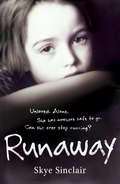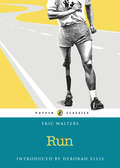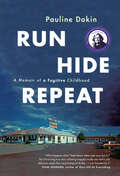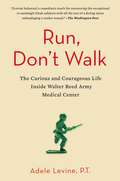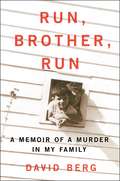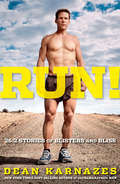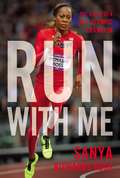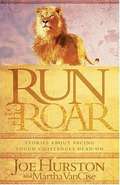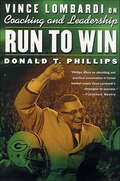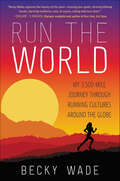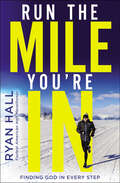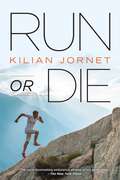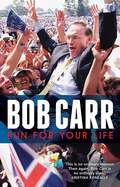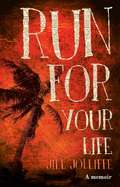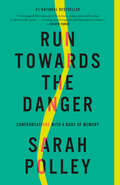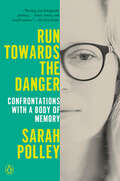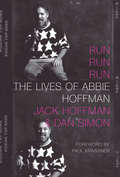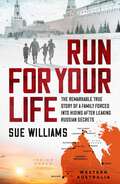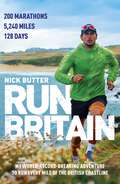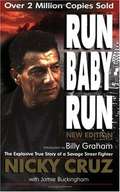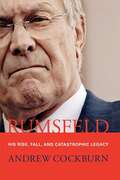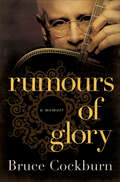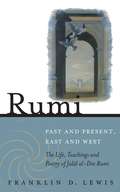- Table View
- List View
Runaway
by Skye SinclairSkye's story is one of survival against the odds. Abandoned by her mother at the age of four and placed in a series of horrible institutions, she learnt to fend for herself from an early age. After a horrific rape when she was ten, she ran from the care home and went to live with the gypsies in the New Forest. She always yearned for freedom and was fearless and impulsive. Her curiosity took her all over the world -- from the abattoirs of France at the age of 15 to the dizzy heights of the Paris fashion world, onto the underbelly of Amsterdam where she became a diamond smuggler at the age of 17 and then to the film studios of Hollywood where she worked as a stunt woman on films like Blues Brothers. Her life took a very different turn when she moved to the island of Phuket in Thailand, adopted four children from different backgrounds, Angelia Jolie-style, and started to sponsor another three. With a group of friends she helped set up an orphanage for street children in neighbouring Cambodia who were eking out a miserable existence on one of the municipal rubbish dumps in Pnom Phen.At the age of 45 her life revolves around children, both her own four and the Cambodians she has pledged to help. The runaway street child has fianlly found a reason to stop running.
Runaway
by Skye SinclairSkye's story is one of survival against the odds. Abandoned by her mother at the age of four and placed in a series of horrible institutions, she learnt to fend for herself from an early age. After a horrific rape when she was ten, she ran from the care home and went to live with the gypsies in the New Forest. She always yearned for freedom and was fearless and impulsive. Her curiosity took her all over the world -- from the abattoirs of France at the age of 15 to the dizzy heights of the Paris fashion world, onto the underbelly of Amsterdam where she became a diamond smuggler at the age of 17 and then to the film studios of Hollywood where she worked as a stunt woman on films like Blues Brothers. Her life took a very different turn when she moved to the island of Phuket in Thailand, adopted four children from different backgrounds, Angelia Jolie-style, and started to sponsor another three. With a group of friends she helped set up an orphanage for street children in neighbouring Cambodia who were eking out a miserable existence on one of the municipal rubbish dumps in Pnom Phen.At the age of 45 her life revolves around children, both her own four and the Cambodians she has pledged to help. The runaway street child has fianlly found a reason to stop running.
Run: Puffin Classics Edition
by Eric WaltersIn conjunction with the Terry Fox Foundation, award-winning author Eric Walters brings Terry Fox and the Marathon of Hope to life for a whole new generation of young readers This first book for young readers about Terry Fox and the Marathon of Hope, written by one of Canada&’s best-known writers for young adults, is a blending of fact and fiction, fully endorsed by The Terry Fox Foundation. Hundreds of thousands of young Canadians participate in the Terry Fox Run each year and this book will further enhance their knowledge of Terry&’s epic journey. Run introduces a national hero to a new generation of readers. In his trademark page-turning style, Eric Walters, bestselling author of Trapped in Ice and Camp X, tells the story of Winston MacDonald. In trouble again after a suspension from school and a runaway attempt, Winston is sent to spend time with his father—a journalist who hasn&’t been around much since his family split up a year ago. Travelling to Nova Scotia with his father, who is covering what he thinks is just a human interest story about a man trying to run across the country, Winston spends a day with Terry Fox and his best friend, Doug. Their determination to achieve what seems like an impossible goal makes a big impression on Winston, and he takes courage and inspiration from Terry&’s run. He is overjoyed when his father&’s article about the Marathon of Hope ignites public interest across the country. But when Winston discovers that his father&’s next article about the Marathon of Hope will characterize Terry and Doug in an unflattering way, he is furious with his father and fearful of betraying his friends. Unsure of what to do or where to turn, Winston decides it is time to make a run for it himself...
Run, Hide, Repeat: A Memoir of a Fugitive Childhood
by Pauline DakinAn unforgettable family tale of deception and betrayal, love and forgivenessPauline Dakin spent her childhood on the run. Without warning, her mother twice uprooted her and her brother, moving thousands of miles away from family and friends. Disturbing events interrupt their outwardly normal life: break-ins, car thefts, even physical attacks on a family friend. Many years later, her mother finally revealed they'd been running from the Mafia and were receiving protection from a covert anti-organized crime task force. But the truth was even more bizarre. Gradually, Dakin's fears give way to suspicion. She puts her journalistic training to work and discovers that the Mafia threat was actually an elaborate web of lies. As she revisits her past, Dakin uncovers the human capacity for betrayal and deception, and the power of love to forgive. Run, Hide, Repeat is a memoir of a childhood steeped in unexplained fear and menace. Gripping and suspenseful, it moves from Dakin's uneasy acceptance of her family's dire situation to bewildered anger. As compelling and twisted as a thriller, Run Hide Repeat is an unforgettable portrait of a family under threat, and the resilience of family bonds.
Run, Don't Walk
by Adele LevineM*A*S*H meets Scrubs in a sharply observant, darkly funny, and totally unique debut memoir from physical therapist Adele Levine. In her six years at Walter Reed Army Medical Center, Adele Levine rehabilitated soldiers admitted in worse and worse shape. As body armor and advanced trauma care helped save the lives--if not the limbs--of American soldiers fighting in Afghanistan and Iraq, Walter Reed quickly became the world leader in amputee rehabilitation. But no matter the injury, physical therapy began the moment the soldiers emerged from surgery. Days at Walter Reed were intense, chaotic, consuming, and heartbreaking, but they were also filled with camaraderie and humor. Working in a glassed-in fishbowl gymnasium, Levine, her colleagues, and their combat-injured patients were on display at every moment to tour groups, politicians, and celebrities. Some would shudder openly at the sight--but inside the glass and out of earshot, the PTs and the patients cracked jokes, played pranks, and compared stumps. With dazzling storytelling, Run, Don't Walk introduces a motley array of oddball characters including: Jim, a retired lieutenant-colonel who stays up late at night baking cake after cake, and the militant dietitian who is always after him; a surgeon who only speaks in farm analogies; a therapy dog gone rogue; --and Levine's toughest patient, the wild, defiant Cosmo, who comes in with one leg amputated and his other leg shattered. Entertaining, engrossing, and ultimately inspiring, Run, Don't Walk is a fascinating look into a hidden world.
Run, Brother, Run: A Memoir of a Murder in My Family
by David BergA searing family memoir, hailed as "remarkable" (The New York Times), "compelling" (People), and "engrossing" (Kirkus Reviews), of a trial lawyer's tempestuous boyhood in Texas that led to the vicious murder of his brother by the father of actor Woody Harrelson.In 1968, David Berg's brother, Alan, was murdered by Charles Harrelson, a notorious hit man and father of Woody Harrelson. Alan was only thirty-one when he disappeared (David was twenty-six) and for more than six months his family did not know what had happened to him--until his remains were found in a ditch in Texas. There was an eyewitness to the murder: Charles Harrelson's girlfriend, who agreed to testify. For his defense, Harrelson hired Percy Foreman, then the most famous criminal lawyer in America. Despite the overwhelming evidence against him, Harrelson was acquitted. After burying his brother all those years ago, David Berg rarely talked about him. Yet in 2008 he began to remember and research Alan's life and death. The result is Run, Brother, Run: part memoir--about growing up Jewish in 1950s Texas and Arkansas--and part legal story, informed by Berg's experience as a seasoned lawyer. Writing with cold-eyed grief and a wild, lacerating humor, Berg tells us first about the striving Jewish family that created Alan Berg and set him on a course for self-destruction, and then about the miscarriage of justice when Berg's murderer was acquitted. David Berg brings us a painful family history, a portrait of an iconic American place, and a true-crime courtroom murder drama that "elegantly brings to life the rough-and-tumble boomtown that was 1960s-era Houston, and conveys with unflinching force the emotional damage his brother's death did to his family" (The New York Times).
Run, Brother, Run
by David BergFrom a renowned trial lawyer, a searing family memoir of a wild boyhood in Texas that led to the vicious murder of the author's brother by actor Woody Harrelson's father.In 1968 David Berg's brother, Alan, was murdered by Charles Harrelson--notorious hit man and father of Woody Harrelson. Alan was only thirty-one when he disappeared and for more than six months his family did not know what had happened to him--until his remains were found in a ditch in Texas. There was an eyewitness to the murder: Harrelson's girlfriend, who agreed to testify. Even so, Harrelson was acquitted with the help of the most famous criminal lawyer in America. Writing with cold-eyed grief and lacerating humor, Berg shares intimate details about his striving Jewish family that perhaps set Alan on a course for self-destruction, and the wrenching miscarriage of justice when Berg's murderer went unpunished. Since burying his brother, David has never discussed how he died. But then about three years ago, details from his past crept into his memory and he began to research his family's legacy and his brother's death, informed by his expertise as a seasoned attorney. The result is a raw and painful memoir that taps into the darkest human behaviors, a fascinating portrait of an iconic American place, and a true-crime courtroom murder drama--all perfectly calibrated.
Run!: 26. 2 Stories Of Blisters And Bliss
by Dean KarnazesIn his follow-up to the best-selling Ultramarathon Man—which Sports Illustrated called "fascinating" and the New York Times said was "full of euphoric highs"—world-renowned ultramarathoner Dean Karnazes chronicles his unbelievable exploits and explorations in gripping detail. Karnazes runs for days on end without rest, across some of the most exotic and inhospitable places on earth, including the Australian outback, Antarctica, and the Tenderloin District of San Francisco.From the downright hilarious to the truly profound, the linked stories in Run! create an unforgettable tableau, providing readers with the ultimate escape and offering a rare glimpse into the mind-set and motivation of an extreme athlete. Karnazes addresses the pain and perseverance and also charts his emotional state as he pushes the edges of human achievement. The tales of the friendships he's cultivated on his many adventures around the world warm the heart and are sure to captivate and inspire readers whether they run great distances, modest distances, or not at all.
Run with Me: The Story of a U.S. Olympic Champion
by Sanya Richards-RossFor as long as four-time Olympic gold medalist Sanya Richards-Ross can remember, life has been measured in seconds—the fewer, the better. The Jamaican-American sprinter has been a star track and field athlete since she first began racing, ranking No. 1 in the world and bringing home Olympic and World Championship accolades. A role model for runners around the world, Sanya’s incredible success is matched only by her spirit both on and off the track.From her early days running in Jamaica to her final race, Sanya shares the importance of determination, courage and faith. She uses the 4 Ps—push, pace, position and poise—a model created by her coach, Clyde Hart, to approach and tackle every obstacle. In her book, Sanya reveals how these strategies have helped her and will help kids learn how to run their best race in life.Run with Me is Sanya’s story—her wins and her losses—chronicling her unique triumphs and trials with fame, family and faith. Written purposely for the 8-12 audience, this book will inspire kids to pursue their dreams at full speed.
Run to the Roar
by Joe Hurston Martha VanciseWhat do you do when facing lions on a spiritual safari? Veteran missionary pilot Joe Hurston uses a lion's characteristics to teach life changing spiritual principles while demonstrating the leadership principles of perseverance and confidence in the face of difficulty to fulfill god's plan for your life. A successful businessman, Hurston supports each principle with anecdotal you-can-do-it stories from his life experiences on the mission field. His accounts, including many years of work in Haiti and his more recent relief outreach to victims of the tsunami in Asia, are exciting and encouraging. Combining an entrepreneur's passion with a Christian heart, this book is an adventure lesson tool for developing strong leadership skills.
Run to Win: Vince Lombardi on Coaching and Leadership
by Donald T. PhillipsVince Lombardi, whom many believe to be the greatest football coach in the history of the sport, is both a household name and an icon. He is not only renowned in the sports world, but also in business and industry for his exceptional leadership skills. In Run to Win, acclaimed author Don Phillips examines Lombardi's famous coaching style by painting a picture of a fascinating individual, a man whose ingenious leadership helped lead his teams to nine playoff victories in a row, including wins in the first two Super Bowls. By extracting powerful lessons from a man who could both lead and inspire, Phillips gets to the heart of what made Lombardi great and shows readers what it takes to be a winner. At the same time, this groundbreaking book tells the inspiring story of Lombardi's ten-year career with the Green Bay Packers and Washington Redskins, complete with anecdotes, quotes, and Lombardi Principles that show why this legendary coach continues to be a role model for effective leadership in business today.Totally accessible and utterly fascinating, Donald T. Phillips's Run to Win empowers readers with the knowledge to succeed in business, while entertaining them with tales of a man whose ability to win under any circumstance is unsurpassed in the history of professional sports.
Run the World: My 3,500-Mile Journey through Running Cultures around the Globe
by Becky WadeFrom elite marathoner and Olympic hopeful Becky Wade comes the story of her year-long exploration of diverse global running communities from England to Ethiopia—9 countries, 72 host families, and over 3,500 miles of running—investigating unique cultural approaches to the sport and revealing the secrets to the success of runners all over the world.Fresh off a successful collegiate running career—with multiple NCAA All-American honors and two Olympic Trials qualifying marks to her name—Becky Wade was no stranger to international competition. But after years spent safely sticking to the training methods she knew, Becky was curious about how her counterparts in other countries approached the sport to which she’d dedicated over half of her life. So in 2012, as a recipient of the Watson Fellowship, she packed four pairs of running shoes, cleared her schedule for the year, and took off on a journey to infiltrate diverse running communities around the world. What she encountered far exceeded her expectations and changed her outlook into the sport she loved.Over the next twelve months—visiting 9 countries with unique and storied running histories, logging over 3,500 miles running over trails, tracks, sidewalks, and dirt roads—Becky explored the varied approaches of runners across the globe. Whether riding shotgun around the streets of London with Olympic champion sprinter Usain Bolt, climbing for an hour at daybreak to the top of Ethiopia’s Mount Entoto just to start her daily run, or getting lost jogging through the bustling streets of Tokyo, Becky’s unexpected adventures, keen insights, and landscape descriptions take the reader into the heartbeat of distance running around the world.Upon her return to the United States, she incorporated elements of the training styles she’d sampled into her own program, and her competitive career skyrocketed. When she made her marathon debut in 2013, winning the race in a blazing 2:30, she became the third-fastest woman marathoner under the age of 25 in U.S. history, qualifying for the 2016 Olympic Trials and landing a professional sponsorship from Asics.From the feel-based approach to running that she learned from the Kenyans, to the grueling uphill workouts she adopted from the Swiss, to the injury-recovery methods she learned from the Japanese, Becky shares the secrets to success from runners and coaches around the world. The story of one athlete’s fascinating journey, Run the World is also a call to change the way we approach the world’s most natural and inclusive sport.
Run the Mile You're In: Finding God in Every Step
by Ryan HallJourney with Olympian and American half marathon record holder Ryan Hall as he reflects on the joys and trials of running and, along the way, shows you how he found God in every step.Ryan Hall is an Olympic athlete and American record holder in the half marathon, but as a kid, Ryan hated running. He wanted nothing to do with the sport until one day, he felt compelled to run the fifteen miles around his neighborhood lake. He was hooked.From that day forward, Ryan felt a God-given purpose in running. He knew he could, and would, race with the best runners in the world and that his talent was a gift to serve others. These two truths launched Ryan's twenty-year athletic career and guided him through epic failures and exceptional breakthroughs to competing at the highest level.Now a coach, speaker, and nonprofit partner, Ryan shares the powerful faith behind his athletic achievements and the lessons he learned that helped him push past his limits, make space for relationships that enrich his life on and off the running trails, and cultivate a positive mindset.As you learn more about Ryan and his incredible path, you'll gain the tools you need to:Focus on your purpose and say no to distractionsSelect and strive for the right goals--goals for the heart and the bodyDeal with defeat and disappointmentEndure immense pain and build resilienceRun like you've already wonRyan's story is one of encouragement and inspiration for readers of any age and level of running ability--or none at all. It's a story that shows that you, too, can change your outlook, see God's hand in your life, and run the race that really matters.Praise for Run the Mile You&’re In:"Run the Mile You're In is not about winning races and setting running records. It's about always moving forward. Moving outward is an act of courage. The reward is living the lifestyle and embracing the dream."--Bart Yasso, newly retired chief running officer, Runner's World"Ryan's journey on and off the course is touching and a meaningful way to live by helping others. This is an uplifting book of joy and finding your sense of purpose."--Meb Keflezighi, Olympic silver medalist; Boston Marathon and NYC Marathon champion
Run or Die
by Kilian JornetShortlisted for the 2014 William Hill Sports Book of the Year Award National Geographic Adventurer of the Year 2014 "The most dominating endurance athlete of his generation." -- The New York Times An exceptional athlete. A dominating force. An extraordinary person. Kilian Jornet has conquered some of the toughest physical tests on the planet. He has run up and down Mt. Kilimanjaro faster than any other human being, and struck down world records in every challenge that has been proposed, all before the age of 25. Redefining what is possible, Jornet continually pushes the limits of human ability, astonishing competitors with his near-superhuman fitness and ability. Born and raised at 6,000 feet above sea level in the Spanish Pyrenees, Jornet climbed an 11,000 foot mountain -- the highest mountain in the region -- at age 5. Now Jornet adores the mountains with the same ferocity with which he runs them. In Run or Die he shares his passion, inviting readers into a fascinating world rich with the beauty of rugged trails and mountain vistas, the pulse-pounding drama of racing, and an intense love for sport and the landscapes that surround him. In his book, Jornet describes his record-breaking runs at Lake Tahoe, Western States 100, Ultra-Trail du Mont-Blanc, and Mount Kilimanjaro--the first of his ambitious Summits of My Life project in which Jornet will attempt to break records climbing the highest peaks on each continent. In turns inspiring, insightful, candid, and deeply personal, this is a book written from the heart of the world's greatest endurance runner, for whom life presents one simple choice: Run. Or die. "Trail running's first true breakout star, [Jornet] has yet to find a record he can't shatter." -- Runner's World
Run for Your Life
by Bob CarrAll author proceeds from this book are donated to help the children displaced by the Syrian civil war by funding humanitarian aid through the registered charity Australia for UNHCR. Most political memoirs are boring. Bob Carr tears up the rules. He plunges in, beginning with the despair of a young man pining for a political career, convinced he's going nowhere, then vaulting to the exhilaration of a premier who, on one day, saves a vast forest and unveils the country's best curriculum. He lashes himself for ignoring a cry from a prisoner in a cell and for a breach of protocol with a US Supreme Court judge. He considers talking to the leader of a notorious rape gang and celebrates winning power against the odds: a leader without kids or any interest in sport. He describes growing up in a fibro house without sewerage and a 'lousy education' that produced a lifetime appetite for self-learning. He is candid about dealing with the media, dining with royals, working for Kerry Packer. He reveals the secrets he learnt from Neville Wran. He is open about his adulation of Gough Whitlam. Floating above all is Bob Carr's idea of public service in a party, he says, that resembles an old, scarred, barnacled whale. In an era of bland politicians, here's one with personality true to his quirky self. Silence the jet skis! Balance the budget! Liberate the dolphins! Roll out the toll roads! Declare a million hectares of eucalypt wilderness! Be a politician of character.
Run for Your Life
by Jill JolliffeUnwillingly given up by her birth mother and adopted into a violent household, Jill Jolliffe found the course of her life set before she even had time to choose. She ran away as a teenager and has been running ever since. Jolliffe became a thorn in the establishment's side and earned herself a hefty ASIO file. Following her instincts, she became a foreign correspondent - risking her life to report on Indonesia's occupation of East Timor, exposing sex-trafficking rackets in Portugal and ducking bullets while covering a war in Angola. Over time she realises that the recurring pattern of her career has been reporting the stories of young women in distress, as though trying to free her younger self from the chains of being a 'Forgotten Australian'. In the course of writing her memoir, an unexpected meeting with her birth mother takes her life full circle.
Run Towards the Danger: Confrontations with a Body of Memory
by Sarah Polley&“Fascinating, harrowing, courageous, and deeply felt, these explorations of &‘dangerous stories,&’ harmful past events, and trials of the soul speak to all who&’ve encountered dark waters and have had to navigate them.&” —Margaret Atwood via Twitter &“Sarah Polley tells us the truth, even when it feels razor sharp—even when it feels dangerous. These brilliant essays urge us, by example, towards the examined life, the life worth living, and give us a jolt of energy to muster the courage and compassion needed to live it.&” —Miriam Toews, bestselling author of Women TalkingNamed a Most-Anticipated Book of 2022 by Entertainment Weekly, Lit Hub, and AV ClubOscar-nominated screenwriter, director, and actor Sarah Polley&’s Run Towards the Danger explores memory and the dialogue between her past and her present.These are the most dangerous stories of my life. The ones I have avoided, the ones I haven&’t told, the ones that have kept me awake on countless nights. As these stories found echoes in my adult life, and then went another, better way than they did in childhood, they became lighter and easier to carry. Sarah Polley&’s work as an actor, screenwriter, and director is celebrated for its honesty, complexity, and deep humanity. She brings all of those qualities along with her exquisite storytelling chops to these six essays. Each one captures a piece of Polley&’s life as she remembers it, while at the same time examining the fallibility of memory, the mutability of reality in the mind, and the possibility of experiencing the past anew, as the person you are now but were not then. As Polley writes, the past and present are in a &“reciprocal pressure dance.&” Polley contemplates stories from her own life ranging from stage fright to high risk childbirth to endangerment and more. After struggling with the aftermath of a concussion, Polley met a specialist who gave her wholly new advice: to recover from a traumatic injury, she had to retrain her mind to strength by charging towards the very activities that triggered her symptoms. With riveting clarity, she shows the power of applying that same advice to other areas of her life in order to find a path forward, a way through. Rather than live in a protective crouch, she had to run towards the danger. In this extraordinary book, Sarah Polley explores what it is to live in one&’s body, in a constant state of becoming, learning, and changing.
Run Towards the Danger: Confrontations with a Body of Memory
by Sarah Polley&“A visceral and incisive collection of six propulsive personal essays.&” – Vanity Fair*A New York Times Book Review Editors' Choice*Named a Most-Anticipated Book of 2022 by Entertainment Weekly, Lit Hub, and AV Club*New York Times Paperback Row*From the Academy Award-winning screenwriter of Women Talking and the acclaimed director and actor Sarah Polley, Run Towards the Danger explores memory and the dialogue between her past and her presentThese are the most dangerous stories of my life. The ones I have avoided, the ones I haven&’t told, the ones that have kept me awake on countless nights. As these stories found echoes in my adult life, and then went another, better way than they did in childhood, they became lighter and easier to carry.Sarah Polley&’s work as an actor, screenwriter, and director is celebrated for its honesty, complexity, and deep humanity. She brings all those qualities, along with her exquisite storytelling chops, to these six essays. Each one captures a piece of Polley&’s life as she remembers it, while at the same time examining the fallibility of memory, the mutability of reality in the mind, and the possibility of experiencing the past anew, as the person she is now but was not then. As Polley writes, the past and present are in a &“reciprocal pressure dance.&” Polley contemplates stories from her own life ranging from stage fright to high-risk childbirth to endangerment and more. After struggling with the aftermath of a concussion, Polley met a specialist who gave her wholly new advice: to recover from a traumatic injury, she had to retrain her mind to strength by charging towards the very activities that triggered her symptoms. With riveting clarity, she shows the power of applying that same advice to other areas of her life in order to find a path forward, a way through. Rather than live in a protective crouch, she had to run towards the danger. In this extraordinary book, Polley explores what it is to live in one&’s body, in a constant state of becoming, learning, and changing.
Run Run Run: The Lives of Abbie Hoffman
by Dan Simon Jack HoffmanIntertwining the details of Abbie Hoffman's intense personal life with the movement politics of the sixties, seventies, and eighties, Dan Simon writes Abbie's story from the point of view of his younger brother Jack, creating a full and poignant portrait of one of the geniuses of the 1960s counterculture. From the creation of the Yippies! in 1967 and the tumult of the 1968 Democratic National Convention protests, to the humor and agony of the Chicago conspiracy trial, the scandal of Abbie's 1973 cocaine bust, and his six and a half years as a fugitive, to his reemergence as environmentalist "Barrie Freed' and his final struggle with manic-depressive illness, this biography offers a compelling examination of the contradictions that make Abbie Hoffman such a compelling figure. With the information and affection only a brother could bring to the complexities of Abbie's life, Hoffman and Simon portray Abbie's public persona alongside his private aspirations and fears, romances, and enduring family relationships.
Run For Your Life: The remarkable true story of a family forced into hiding after leaking Russian secrets
by Sue WilliamsThe remarkable true story of a family forced into hiding after leaking Russian secrets What started out as a great adventure turned into a terrifying nightmare when Nick Stride and his family were forced to flee for their lives from one of the richest, most powerful men in the world. Nick moved to Russia in 1998 to help build the British Embassy in Moscow, but ended up on the run with his wife and two children after leaking secrets from Vladimir Putin&’s one-time deputy. Hiding off grid on Australia&’s final frontier – remote beaches on the Dampier Peninsula on the far north Kimberley coast – the family faced crocodiles, sharks, snakes, raging bushfires and the devastating Cyclone Yvette, and survived only by catching fish and crabs and learning how to kill wild animals. It was a life-or-death move, but Nick felt he had no choice. Now, emerging from isolation, the family are finally ready to share their incredible story.
Run Britain: My World Record-Breaking Adventure to Run Every Mile of the British Coastline
by Nick ButterIn the spring of 2021, as the UK's latest pandemic lockdowns were lifted, Nick Butter set out from the Eden Project to become the fastest person to cover every mile of Britain's mainland coastline on foot.Battling the most extreme winds Britain had seen in 100 years, days of torrential rain and the unrelenting hills of Western Scotland and Cornwall, Nick suffered two broken bones and countless injuries, whilst taking on two marathons a day, every day, for 100 days.Covering an extraordinary 5,250 miles, running for over 12 hours a day, struggling to take in the 8,000 daily calories required to fuel his body, Nick battled sleep deprivation and extreme weight loss as he pushed his body and mind to their limit.Supported by close friends and family (including his ever-dependable right-hand man, Andy Swain, whose diary extracts feature in this book), Nick experienced spiralling lows and euphoric highs. As he traversed footpaths, country lanes and busy A roads, he passed through over two thousand coastal communities, buoyed along by supporters cheering from windows, balconies, passing cars and pavements, by school children and fellow runners, and by the stunning sights and sounds of the British coast.Run Britain is Nick's account of his extraordinary adventure.
Run Baby Run: The Explosive True Story of a Savage Street Fighter
by Jamie Buckingham Nicky CruzFrom the Book Jacket: "This is the thrilling story of Nicky Cruz's desperate battle against drugs, alcoholism, and a violent environment, as he searched for a better way of life on the streets of New York City." Now the founder of a Christian ministry that provides outreach to addicted and struggling youth, Cruz presents here the testimony of how he came to faith in Jesus Christ, and enumerates the reasons his new way of life has proved more fulfilling than his life on the streets. Includes ways in which parents, churches, and communities can reach out to gangs and to teens addicted to drugs and alcohol.
Rumsfeld: His Rise, Fall, and Catastrophic Legacy
by Andrew CockburnDonald Rumsfeld, who as secretary of defense oversaw the army, navy, air force, and marines from 2001 to December 2006, is widely blamed for the catastrophic state of America's involvement in Iraq. In his groundbreaking book Rumsfeld, Washington insider Andrew Cockburn details Rumsfeld's decisions in the wars in Iraq and Afghanistan and also shows how his political legacy stretches back decades and will reach far into the future. Relying on sources that include high-ranking officials in the Pentagon and the White House,Rumsfeldgoes far beyond previous accounts to reveal a man consumed with the urge to dominate each and every human encounter, and whose aggressive ambition has long been matched by his inability to display genuine leadership or accept responsibility for egregious error. Cockburn exposes Rumsfeld's early career as an Illinois congressman, his rise to prominence as an official in the Nixon White House, his careful maneuvering to avoid the fallout of the Watergate scandal, and his skillful infighting as secretary of defense under President Ford. Cockburn also chronicles for the very first time Rumsfeld's subsequent tenure as CEO of G. D. Searle (and his devoted efforts to get governmental approval for the controversial artificial sweetener aspartame) as well as his interesting behavior in secret high-level government nuclear war games in the years he was out of power. President George W. Bush's hasty elevation of Rumsfeld as his secretary of defense proved historic, for it was the triumvirate of Bush, Vice President Dick Cheney, and Rumsfeld who plunged America into the disastrous quagmire of the war in Iraq. Cockburn reveals how Rumsfeld's habits of intimidation, indecision, ignoring awkward realities, destructive micromanagement, and bureaucratic manipulation all helped doom America's military adventure. The book challenges the notion that Rumsfeld was an effective manager driven to transform the American military, examines the reasons that Rumsfeld was removed from office, and shows how his second appointment as secretary of defense reflects a deep conflict between President Bush and his father, former president George H. W. Bush. Brimming with powerful revelations,Rumsfeldis sure to emerge as the must-have piece of investigative journalism as America grapples with its difficult involvement in Iraq and the uncertain path the country faces today.
Rumours of Glory: A Memoir
by Bruce CockburnAward-winning songwriter and pioneering guitarist Bruce Cockburn has been shaped by politics, protest, romance, and spiritual discovery. He has toured the globe, visiting far-flung places such as Guatemala, Mali, Mozambique, Afghanistan, and Nepal, performing and speaking out on diverse issues from native rights and land mines to the environment and Third World debt. His journeys have been reflected in his music and evolving styles: folk, jazz, blues, rock, and world beat. Drawing from his experiences, he continues to create memorable songs about his ever-expanding universe of wonders.As an artist with thirty-one albums, Cockburn has won numerous awards and the devotion of legions of fans across America and his native Canada. Yet the man himself has remained a mystery. In this memoir, Cockburn invites us into his private world and takes us on a lively cultural and musical tour through the late twentieth century, sharing his Christian convictions, his personal relationships, and the social and political activism that has defined him and has both invigorated and incited his fans.
Rumi: Past and Present, East and West
by Franklin D. LewisThis long awaited paperback edition describes the key events in Rumi's magical life story: his unusual childhood, his relationship with his father, and his intense, though controversial, affection for a wandering dervish.
